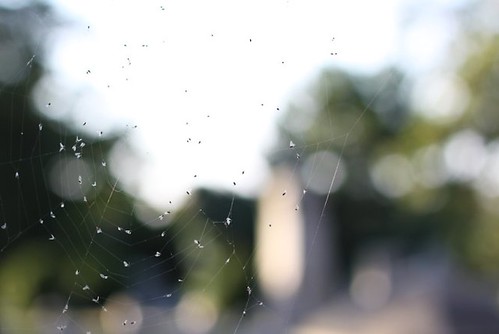Sometimes you read something and it's like somebody reached inside your brain, plucked your thoughts out, and wrote them down for you. It's a validating, affirming experience, especially if you're in a lonely place. That's how I feel about this post from Amy Eden's blog, Guess What Normal Is, in which she reminds her readers:
How will you know (a) that your family-of-origin is still dysfunctional (because when you begin to grow and heal, you’ll sometimes forget…after all you’re trained to forget), and (b) how will you know that you're really being a champion of your personal perspective, truth, and needs?
The answer is this: when your family starts to get agitated, mad, throw emotional darts, stop talking to you, ask if you’re depressed or having some kind of early menopause or cancer of the smart, loyal part of your brain – that’s how you’ll know. You’re finally knowing what you want, seeing things as they are, not blaming yourself, not excusing their behavior, and starting to move past surviving and into thriving when the boundaries you’re setting—and the loyalties you’re no longer recognizing—invoke emotional itchiness in those around you; they’ll reach for whatever blackmail techniques they reach for when they feel threatened. It’s the abandonment that we fear—which I fear, the withdrawal of my family from me just when I’m actually, finally living and behaving from the center of who I really am.Speaking out is the ultimate sin in a dysfunctional family. It's considered disloyalty, breaking of confidences, airing dirty laundry. If you really must talk about your (stupid little) (probably imaginary) problems, you should really only do it in private with your bestest, bestest friend. Never say it out loud in public, because goodness, what would people think?
Abuse thrives on shame and silence. Abusers know it's in their best interest to put on their Sunday Best in public and to act sweet in groups (We love each other soooo much! We're so close!) so that nobody suspects that in private, they're tearing apart the people they supposedly love. And if one of those torn-apart people dares to speak in public, they will deny everything. Who, us? But we're so sweet and cuddly! Everybody has their disagreements, but we loooooove each other! If that person continues to speak up, those still enmeshed in the dysfunction will act as one loyal unit to shame, blame, and otherwise try to cram the errant family member back into their rightful place.
Speaking up is a lonely, lonely, lonely place to be in. Most people would prefer to believe that you're crazy or a histrionic, attention-whoring bitch, rather than consider that maybe what you say is true.
But speaking up is absolutely worth it. Claiming your autonomy, refusing to be treated poorly, telling the truth is absolutely worth it. When I speak the truth, I inevitably hear from people who recognize themselves in that truth, who feel silenced by their own dysfunctional families, who are grateful that somebody is talking about it out loud. And yes, it has to be spoken out loud, because the cost of membership in a dysfunctional family is voicelessness. We cannot police a person who has regained her voice and tell her when and where and how she may share her thoughts; to do so invalidates her and reinforces the shackles of the dysfunctional family.
I've been called an emotional vampire, self-centered, narcissistic, high and mighty. I've been labeled in absentia as suffering from borderline personality disorder (does my HMO have to pay if I wasn't present at the time of diagnosis?). All for what? For saying that it's not ok to treat me like crap, and that I won't remain in a relationship with people who do so. And for sharing those thoughts out loud. Who are the people who treat me like their enemy? My brothers, my parents. The people who, if they were truly loyal to me, should recognize my troubles and be open to discussion and change are instead the least supportive people I know, preferring to call names and deny family history rather than work together to form healthier, more fulfilling relationships. Apparently we only love each other sooooooo much when we all play by the pre-determined, soul-draining rules.
If you're feeling sucked backed into a family vortex, know this: you don't have to be loyal to people who were never, could never be, and will never be loyal to you. You owe them no allegiance.
To whom do you owe allegiance? Yourself. Give yourself your utmost loyalty. If you don't, who will?

I only recently found your blog and I've been reading your posts. This one really resonates with me. I SO TOTALLY GET what you are saying. I've lived with this type of hush/dysfunction. "the cost of membership in a dysfunctional family is voicelessness." I love how you phrase it, so dead-on correct. I'm getting my voice back, ever so slowly. Thank God.
ReplyDeleteI'm glad that you can identify! Well, not glad that you have had similar experiences - I wouldn't wish them on anybody - but I'm glad that children of narcissists can find each other and relate to each other. It's so validating.
ReplyDeleteClaire,
ReplyDeleteI just discovered your blog via Jonsi ... and I just think it's brilliant.
And I hear ya. My FOO has labeled me as mentally ill, "Kiki is just not well!", told all my relatives (convincingly, too, unfortunately) that I have had a nervous breakdown, told their close friends that I've been sexually abused (I haven't) and am going crazy.
All because I said I needed some space to think for a little while.
I used to care and cry about it. Now, I'm thinking that if they considered me normal, then I'd truly be worried. I am not one of the family anymore. I embrace my orphanhood. It beats being part of the crazy family!